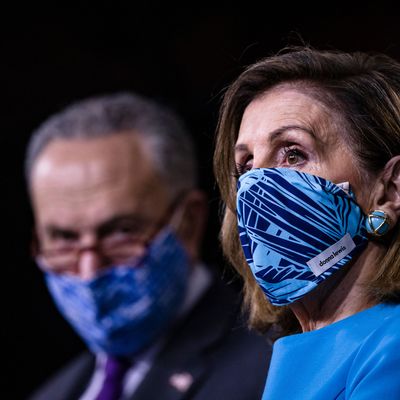
You will be forgiven if you are skeptical that Democrats and Republicans will ever agree on a new COVID-19 relief or stimulus package. After all, negotiations have been off and on, up and down since last spring, and if anything, matters may have regressed given the growing Senate Republican resistance to any robust effort, the absence of the preelection political pressure for action, and the president’s focus on trying to reverse his election defeat. Yes, a bipartisan group of senators released a new compromise proposal this week, but Mitch McConnell (with the support of the White House) objected to it instantly as he continued to tout a “skinny” approach addressing only his own party’s priorities.
But now Democratic congressional leaders Nancy Pelosi and Chuck Schumer, who up until now haven’t moved much beyond the $2.2 trillion measure the House passed in October, are semi-endorsing the bipartisan compromise proposal and asking McConnell to enter into immediate negotiations toward a bill that can be enacted during the lame-duck session. You have to assume President-elect Joe Biden is their silent partner in this effort. Here’s CNBC’s report on the new development:
House Speaker Nancy Pelosi and Senate Minority Leader Chuck Schumer urged Senate Majority Leader Mitch McConnell to use a $908 billion bipartisan stimulus plan as the basis for relief talks, endorsing a smaller relief bill than they previously have.
McConnell and House Majority Leader Steny Hoyer were set to discuss coronavirus stimulus Wednesday for the second time this week.
Lawmakers are rushing to pass a pandemic relief package before the end of the year as the outbreak rages around the country.
McConnell and Hoyer both signaled they could include aid provisions in a spending bill Congress needs to pass by Dec. 11.
The compromise proposal was sponsored by Republican Senators Bill Cassidy, Susan Collins, and Mitt Romney; Democratic Senators Joe Manchin, Angus King, and Mark Warner; and the bipartisan House Problem Solvers Caucus. It includes a little of everything both parties have been pursuing, including a small supplemental unemployment insurance provision, a modest pot of money for state and local governments, and (for Republicans and their corporate clientele) a temporary COVID-19 liability shield. It does not include a second $1,200 stimulus check for taxpayers.
Why are Pelosi and Schumer suddenly embracing this proposal? They likely agree with the reasoning expressed earlier this week by my colleague Eric Levitz:
It’s not clear to me how Democrats end up with a much better deal than this. If they do not sweep the Georgia Senate election runoffs in January, then Mitch McConnell will still control the Senate when Biden takes office, while Nancy Pelosi will preside over a much slimmer House majority than she does now. I see little basis for believing that Democrats will be able to get better terms from this new Congress than they have from the current one.
More important, America’s most vulnerable cannot wait two months for aid.
There’s not much time left for a deal before lawmakers go home for the holidays. If a measure is agreed upon, it will almost certainly be attached to a must-pass appropriations measure (either an omnibus spending bill or another stopgap bill pending final negotiations) needed to avoid a government shutdown on December 11. If McConnell chooses to play ball and Trump can be convinced to stop his manic complaints about the election long enough to sign a bill, it can get done. Then everyone can agree that the runoff elections in Georgia will determine if much of anything more happens in the next Congress to rescue stricken Americans and revive the economy before vaccines are generally available.






























